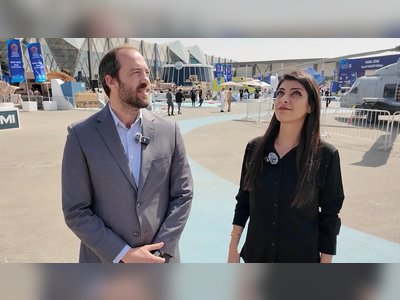
Bill Gates: Middle East to lose 'trillions of dollars' in coronavirus crisis
The coronavirus pandemic is set to wreak “trillions of dollars” of damage on Middle East economies, according to billionaire businessman Bill Gates.
“It’s hard to say what would have happened if there had been no Covid-19, but you’re talking literally trillions of dollars in damage,” Gates told Arabian Business.
“And what does that mean for progress? It means there will be a reversal in GDP and the numbers of people affected by poverty will take decades to recover,” the Microsoft founder and philanthropist added.
The Bill & Melinda Gates Foundation on Tuesday launched its fourth annual Goalkeepers Report, featuring new data showing how the ripple effects of coronavirus have stopped 20 years of progress toward the United Nations Sustainable Development Goals (SDGs).
“Before this pandemic hit, we didn’t have an ideal situation in the Middle East, especially in Yemen, and coronavirus has made that even more challenging,” Gates said.
“[Our foundation] has always had a lot of activities within the UAE regarding eradicating polio... the vaccine should always be the most financeable thing,” he added.
However, Gates predicted that the largest chunk of funds would need to go towards restoring the regional health care system.
“The difficulties of resurrecting the healthcare system will cause more deaths than Covid-19 itself,” Gates said.
“And if the price of oil stays down that might [negatively] affect the scale of the generosity of the richer regional countries,” he added.
“If you don’t stop the disease everywhere, it’s going to coming back,” Gates said. “It’s hard to measure the misery that the pandemic has caused but it’s certainly greater in developing countries – with the inequities, educational setbacks, health setbacks... tracking the level of human misery is even more difficult.”
Vaccine by 2021
However, Gates said there is an “extremely high chance” of having an effective vaccine in production by early 2021, partly due to academic centres and private companies funding the trials on a non-profit basis.
“Around 10 to 20 years ago we would not have been able to create vaccines at this speed,” he said. “India, for example, can now do high-volume, low-cost manufacturing.”
“The first thing we need to do to end the pandemic is develop a vaccine but then the challenge is how do we get them out to everyone that needs them?”

If the US wins the global vaccine race, it must allocate resources to other countries for the pandemic and facilitate the vaccine being made in mini-factories across the world, Gates said.
“We need the capacity to be as large as possible,” he said. “If we can get billions of doses made in 2021 then we can hit multiple goals.”
Still, the number of things that could have been done better in this pandemic is “very large”, Gates added.
“We underestimated the value of masks and it took a while to get that message out,” he said. “Even at this point, the medical knowledge around coronavirus is far less than I would have expected.”
Global lessons
The tech titan said he hoped the world would learn from coronavirus and develop an ability to respond to the next pandemic with ease.
“We are also lucky that the internet was advanced enough for video conferencing and so on – 10 years ago it wouldn’t have been reliable enough," Gates said, adding: "Global innovation will get us out of this thing over the next few years.”
According to him, the onset of coronavirus has accelerated innovation and could see the expedition of better digital government services, digital education and quality telemedicine.
Referring to the latest Goalkeepers Report, Gates said by nearly every indicator, the world has regressed. Coronavirus has directly caused extreme poverty to increase by seven percent, he said.

Vaccine coverage, a good proxy measure for how health systems are functioning, is dropping to levels last seen in the 1990s, setting the world back about 25 years in 25 weeks.
“This year’s report is unique... we have stopped progress and pushed it backwards,” Gates said. “Things have changed a lot in a short space of time,” he warned.
Economic carnage
Economic damage from Covid-19 is reinforcing inequalities. The pandemic has had a disproportionate impact on women, racial and ethnic minority communities, and people living in extreme poverty. Around the world, women are facing an increased burden from rising demands in total unpaid care work and experiencing the majority of job losses. In the United States, the percentage of Black and Latin people who say they cannot pay their rent is twice the percentage of white people.
Despite the bleak projections, Bill and Melinda Gates describe a path to ending the pandemic and resuming progress toward the Global Goals.
In the report, which they co-author every year, they call on the world to collaborate on the development of diagnostics, vaccines, and treatment; manufacture tests and doses as quickly as possible; and deliver these tools equitably based on need rather than the ability to pay.

There are currently several viable strategies to help achieve an equitable outcome, including the Access to Covid-19 Tools (ACT) Accelerator, the most serious collaborative effort to end the pandemic, which brings together proven organisations like Gavi, the Vaccine Alliance and the Global Fund to Fight AIDS, Tuberculosis and Malaria.
“The response to the Covid-19 pandemic has shown us some of the best of humanity: pathbreaking innovation, heroic acts by frontline workers, and ordinary people doing the best they can for their families, neighbours, and communities,” Gates said. “This is a shared global crisis that demands a shared global response.”
The report makes clear that no single country will be able to meet this challenge alone. Any attempts by one country to protect itself while neglecting others will only prolong the hardships caused by the pandemic. Developing and manufacturing vaccines will not end the pandemic quickly unless they are delivered equitably.
According to modelling from Northeastern University, if rich countries buy up the first two billion doses of vaccine instead of making sure they are distributed equitably, then almost twice as many people could die from coronavirus.
The International Monetary Fund projects that, despite the $18 trillion already spent to stimulate economies around the world, the global economy will lose $12 trillion or more by the end of 2021 — the biggest global GDP loss since the end of World War II.

In some countries, spending on emergency stimulus and social protection has prevented worse outcomes. But there are inherent limits to what low- and middle-income countries can do to safeguard their economies, regardless of how effectively those economies have been managed.
Despite these constraints, countries are innovating to meet the challenges. More candidates for vaccines and therapeutics are being developed faster than ever. Pandemic-focused innovations include contact tracing in Vietnam and pooled testing in Ghana, while new or improved digital cash transfer programs are reaching 1.1 billion people in 138 countries.
“One of the most troubling things about this pandemic is that by disrupting health systems and the global economy, it’s starting to erase the progress people have made toward living healthier, more productive lives,” said Melinda Gates in the report.
“Our report highlights actions the world can take to turn things around. Researchers are very close to developing safe, effective coronavirus vaccines, but breakthrough science must be met by breakthrough generosity,” she said.
“We need leaders in government and the pharmaceutical industry to ensure that everyone, regardless of where they live, can access these vaccines. And we’re hopeful that will happen.”
Five things we learned from this article:
- The global economy could lose $12 trillion or more by the end of 2021 - the biggest global GDP loss since the end of World War II
- Bill Gates says there is an “extremely high chance” of having an effective coronavirus vaccine in production by early 2021
- Gates believes that global innovation will get us out of this crisis over the next few years
- Coronavirus has directly caused extreme poverty to increase by 7 percent
- Economic damage from Covid-19 is reinforcing inequalities around the world







